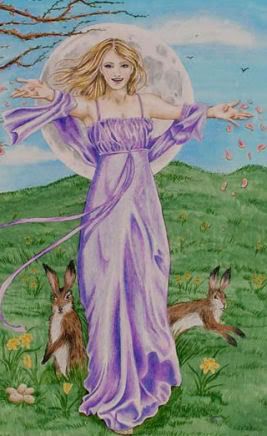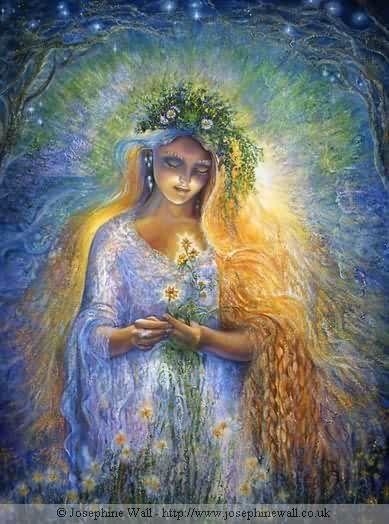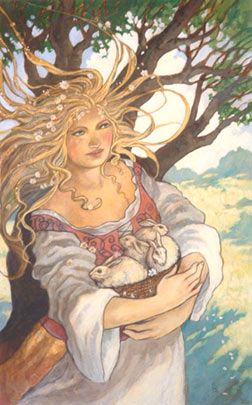Vernal Equinox
The Vernal Equinox, sometimes called Ostara, is celebrated in the Northern hemisphere around March 21 and in the Southern hemisphere around September 23, depending upon the specific timing of the equinox.
 The name Ostara is from ôstarâ, the Old High German for Easter. It has been connected to the putative Anglo-Saxon goddess Eostre by Jacob Grimm in his German Tales. I have to be careful at this point - whispering about other Goddesses within earshot of the Goddess Wiki herself... She has a tendency to jealousy...
The name Ostara is from ôstarâ, the Old High German for Easter. It has been connected to the putative Anglo-Saxon goddess Eostre by Jacob Grimm in his German Tales. I have to be careful at this point - whispering about other Goddesses within earshot of the Goddess Wiki herself... She has a tendency to jealousy... Tell me who doesn't?
This festival is characterized by the rejoining of the Mother Goddess and her lover-consort-son, (...mmmm, bit dodgy that bit, not too sure whether that is feasible?), who spent the winter months in death. (Nice!) Other variations include the young God regaining strength in his youth after being born at Yule, and the Goddess returning to her Maiden aspect. (Too late, too late came Fhina's shrill cry!)
Light and dark are in balance now, but light is gaining. Phew, thank the Goddess Wiki!
The earth awakens... new life emerges, sap rises, buds shoot and spring flowers are celebrated as gifts from nature. Spring returns and rejuvenates our own life force. (I'm waiting... I'm still waiting...)
Ostara, also known as - Oestara, Eostra, Eostre, was the Pagan goddess of fertility and Spring, and the Christian festival of Easter derives its name from her.
Now hands up, particularly those of you asleep at the back! How many of you realised that?
Easter is calculated by the moon, and occurs on the first Sunday after the first full moon after the equinox. This is the time when the young Sun God now celebrates a sacred marriage with the young Maiden Goddess. We celebrate the return of the spring goddess from her long season of dormant sleep. Fhina adores sleep - Did she ever tell you that?
The egg symbolized Eostre's wholeness and fertility - the female hormone oestrogen is named after her - and is offered at this equinox as a symbol of fertility and new life. The golden yolk represents the Sun God, its white shell is seen as the White Goddess.

And our lovely mad March Hares were transformed into the Easter Bunny...
'Nuff said? Don't tell the children, you might frighten them.
And there you have it, mes bloggy chums - Spring in a nutshell, or rather an eggshell! And when you exchange painted or chocolate eggs later this spring, please give a thought to the putative origins of this rite of passage...
A demain mes petits! Spring kiss, you say? Mwah!

